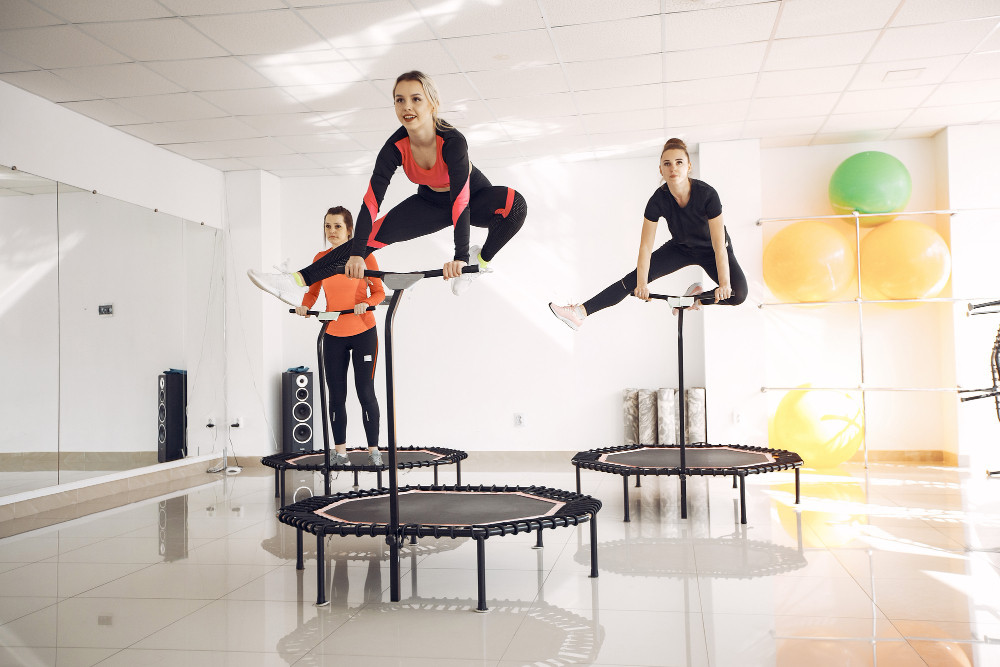Playing on the trampoline is a healthy and enjoyable exercise for both children and adults. Nowadays, trampoline activities are combined with athletic movements that are not only enjoyable but also beneficial to health.
Health Benefits of Trampoline Exercises
A trampoline is a game with a metal frame and fabric that circulates over the sides. This stretch delivers spring power to everyone who jumps on it. Trampolines are typically used for games; however, there are now smaller trampolines called rebounders that are specifically made for sports.
Rebounders are more stable for exercise and less likely to fling you off the trampoline when you jump because of their smaller ground-to-surface distance.
Trampoline activity has the following health benefits:
Increase strength
Jumping on a trampoline requires a lot of leg muscles. When you jump, you take advantage of your body's momentum, which causes all muscles to work simultaneously. This jumping exercise will strengthen the body by training all of the muscles, beginning with the abdominal muscles and progressing to the buttocks, legs, and back.
Read more: Food That Should Be Consumed After Running Sports
Increase bone density
According to the Cleveland Clinic, frequent exercise such as rebounding or jumping on a trampoline (rebounder) can help build bone density. This exercise can help minimize the risk of osteoporosis associated with aging.
Balance training
As we age, our bone density decreases, increasing the chance of injury. According to one study, frequent rebounder exercise can lower the chance of injury while also training balance in the elderly. When you practice, you not only improve your balance but also your coordination and motor skills.
Improve heart performance
Repeatedly jumping is a cardiovascular exercise that helps build cardiac muscle and facilitate blood pumping. You can regulate your blood cholesterol levels and raise your resting heart rate with this activity.
Relieve stress
Jumping on a trampoline might help you feel happier and relieve stress. This exercise not only improves blood circulation by tensing and relaxing movements, but it also produces endorphins, which reduce tension and put you in a better mood.
Read more: Better Where Is Running Sports In The Morning Or At Night?
Tips for Safe Exercise on a Trampoline
Jumping on a trampoline, although relaxing, is a dangerous activity. The American Academy of Pediatrics (AAP) doesn't recommend using trampolines at home, particularly for children under the age of six. These games may increase the risk of fractures, sprains, and other injuries.
There are a few things you should consider before using a small trampoline for exercise:
- Choose a trampoline that is suitable for your weight and age.
- Check that the trampoline is in proper working order and is placed on a stable surface. Avoid placing the trampoline near furniture or walls. Keep your trampoline out of reach of children.
- Warm up before you start exercising. Perform jumping movements and other warm-up exercises to improve the strength and stability of your leg muscles and core.
- Practice according to your ability. You should stop exercising if you experience pain, sprains, or shortness of breath.
Exercising on a trampoline (rebounding) is an enjoyable and healthy alternative sport. You can try it at the closest exercise class in your area. If you have questions regarding fitness, you can either visit a doctor or make use of the consultation features that are available in the Ai Care application by downloading the Ai Care application from the App Store or Play Store.
Looking for more tips and tricks for health, first aid, and home remedies? Click here!
- dr Nadia Opmalina
Venkat, S.R. What to Know About Trampoline Workouts. Available from: https://www.webmd.com/fitness-exercise/what-to-know-about-trampoline-workouts
Cleveland Clinic. (2021). The Many Health Benefits of Exercising on a Trampoline. Available from: https://health.clevelandclinic.org/trampoline-workout-benefits
Marcin, A. (2019). Why You Should Try Rebounding and How to Get Started. Available from: https://www.healthline.com/health/exercise-fitness/rebounding












